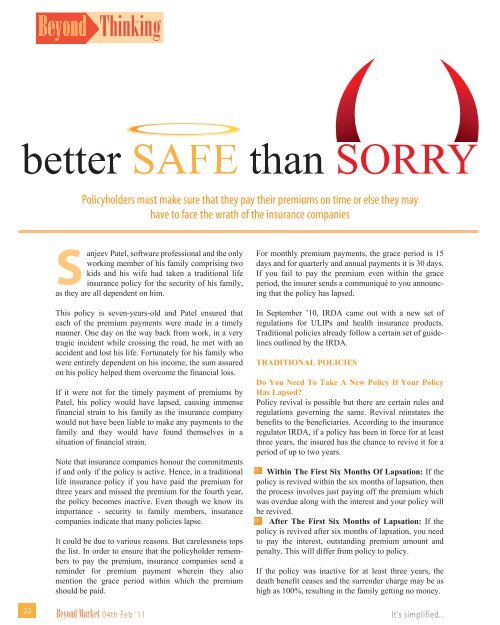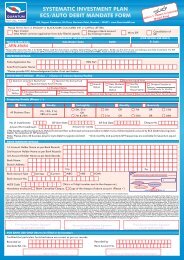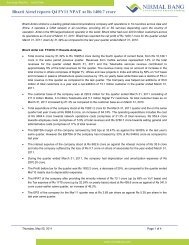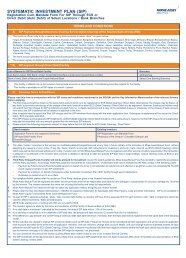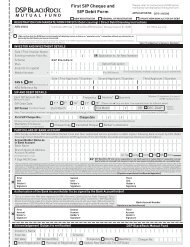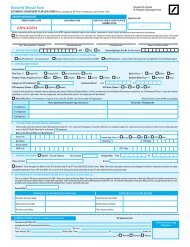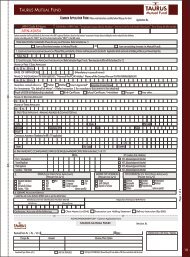to 54646 Contact Person: Sagar Karvat - 077383 80033, e-mail
to 54646 Contact Person: Sagar Karvat - 077383 80033, e-mail
to 54646 Contact Person: Sagar Karvat - 077383 80033, e-mail
Create successful ePaper yourself
Turn your PDF publications into a flip-book with our unique Google optimized e-Paper software.
etter SAFE than<br />
SORRY<br />
22<br />
Policyholders must make sure that they pay their premiums on time or else they may<br />
have <strong>to</strong> face the wrath of the insurance companies<br />
Sanjeev Patel, software professional and the only<br />
working member of his family comprising two<br />
kids and his wife had taken a traditional life<br />
insurance policy for the security of his family,<br />
as they are all dependent on him.<br />
This policy is seven-years-old and Patel ensured that<br />
each of the premium payments were made in a timely<br />
manner. One day on the way back from work, in a very<br />
tragic incident while crossing the road, he met with an<br />
accident and lost his life. Fortunately for his family who<br />
were entirely dependent on his income, the sum assured<br />
on his policy helped them overcome the financial loss.<br />
If it were not for the timely payment of premiums by<br />
Patel, his policy would have lapsed, causing immense<br />
financial strain <strong>to</strong> his family as the insurance company<br />
would not have been liable <strong>to</strong> make any payments <strong>to</strong> the<br />
family and they would have found themselves in a<br />
situation of financial strain.<br />
Note that insurance companies honour the commitments<br />
if and only if the policy is active. Hence, in a traditional<br />
life insurance policy if you have paid the premium for<br />
three years and missed the premium for the fourth year,<br />
the policy becomes inactive. Even though we know its<br />
importance - security <strong>to</strong> family members, insurance<br />
companies indicate that many policies lapse.<br />
It could be due <strong>to</strong> various reasons. But carelessness <strong>to</strong>ps<br />
the list. In order <strong>to</strong> ensure that the policyholder remembers<br />
<strong>to</strong> pay the premium, insurance companies send a<br />
reminder for premium payment wherein they also<br />
mention the grace period within which the premium<br />
should be paid.<br />
Beyond Market 04th Feb ’11<br />
For monthly premium payments, the grace period is 15<br />
days and for quarterly and annual payments it is 30 days.<br />
If you fail <strong>to</strong> pay the premium even within the grace<br />
period, the insurer sends a communiqué <strong>to</strong> you announcing<br />
that the policy has lapsed.<br />
In September ’10, IRDA came out with a new set of<br />
regulations for ULIPs and health insurance products.<br />
Traditional policies already follow a certain set of guidelines<br />
outlined by the IRDA.<br />
TRADITIONAL POLICIES<br />
Do You Need To Take A New Policy If Your Policy<br />
Has Lapsed?<br />
Policy revival is possible but there are certain rules and<br />
regulations governing the same. Revival reinstates the<br />
benefits <strong>to</strong> the beneficiaries. According <strong>to</strong> the insurance<br />
regula<strong>to</strong>r IRDA, if a policy has been in force for at least<br />
three years, the insured has the chance <strong>to</strong> revive it for a<br />
period of up <strong>to</strong> two years.<br />
��� Within The First Six Months Of Lapsation: If the<br />
policy is revived within the six months of lapsation, then<br />
the process involves just paying off the premium which<br />
was overdue along with the interest and your policy will<br />
be revived.<br />
�� � � After The First Six Months of Lapsation: If the<br />
policy is revived after six months of lapsation, you need<br />
<strong>to</strong> pay the interest, outstanding premium amount and<br />
penalty. This will differ from policy <strong>to</strong> policy.<br />
If the policy was inactive for at least three years, the<br />
death benefit ceases and the surrender charge may be as<br />
high as 100%, resulting in the family getting no money.<br />
It’s simplified...


